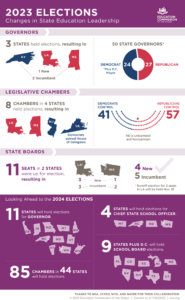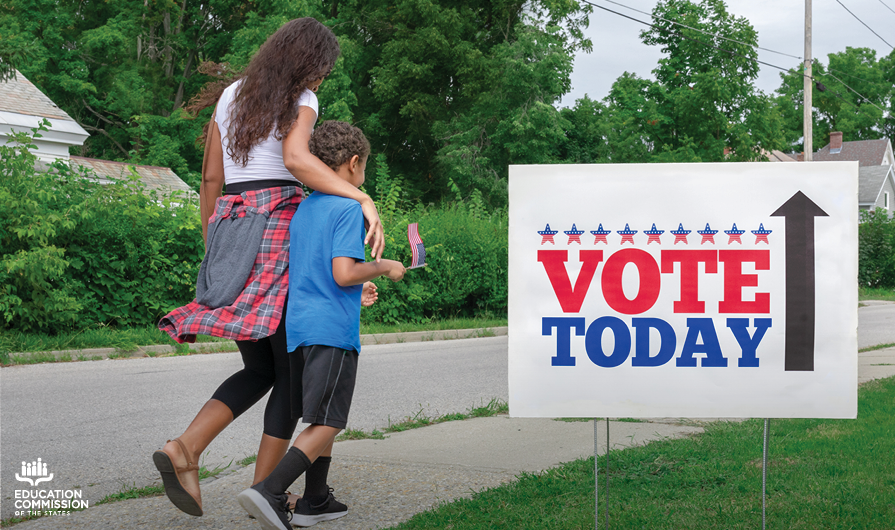Now that the results are in from the 2023 general election, we can understand the implications for state education policy across the United States.
Gubernatorial Elections

This year, Kentucky, Louisiana and Mississippi held gubernatorial elections.
In Kentucky, incumbent Gov. Andy Beshear defeated state Attorney General Daniel Cameron. Now in his second term, Gov. Beshear will look to expand his efforts to improve teacher retention and recruitment, increase funding for postsecondary and workforce programs, and remove financial barriers for postsecondary attainment.
In Louisiana, outgoing Democratic Gov. John bel Edwards was term limited and will be succeeded by Republican Gov.-elect Jeff Landry. Landry secured his victory by defeating Democrat Shawn Wilson in the state's October open primary with a significant enough margin to bypass the general election on Nov. 18.
Gov.-elect Landry will take office in Jan. 2024 and will inherit several education powers for the state, including the power to appoint key education officials and shape state-level education policy. Landry's campaign centered on teacher retention and recruitment, school choice and high school graduation requirements.
Mississippi incumbent Gov. Tate Reeves also held onto his office. In his second term, he will likely continue efforts to expand career and technical education, improve literacy and numeracy rates among elementary school students, and recruit and retain teachers.
Legislative Elections
While most legislative elections take place on even-numbered years, four states (Louisiana, Mississippi, New Jersey and Virginia) held elections for both of their legislative chambers this year. Though not the only special election in the country, New Hampshire's special election for its state House of Representatives may lead to further changes in the chamber.
Seven out of eight chambers remained in the respective party’s control, giving Republicans control of both chambers of the Louisiana and Mississippi Legislatures, and Democrats control of both chambers of the New Jersey Legislature. Notably, the Virginia State House of Delegates flipped from Republican to Democratic control, which gave the Democratic Party control of both the Virginia Senate and the House of Delegates.
The special election for the New Hampshire House of Representatives left the 400-seat chamber closely balanced with 197 Democratic members, 198 Republican members, two independent members and one member with no affiliation — leaving two additional vacancies. This sets the stage for a potential party shift following the special election on Jan. 23, 2024.
State Boards of Education
Two states held state board of education elections while gubernatorial elections in two other states may impact respective state boards.
In Washington, five board positions are elected by members of Washington State School Directors’ Association. The seats representing the Western region and private schools have been decided, while the seat representing the state’s Eastern region heads to a run-off election on Nov. 10. WSSDA will publicly announce the winners of all three races on Nov. 18 when the run-off is finalized, but the results of the general election are available.
And, in Louisiana, the October open primary resulted in four Republican seats and two Democratic seats. The remaining two state board members will be elected during the general election on Nov. 18.
In Mississippi and Kentucky, state board of education members are appointed by the governor. While the incumbents held onto the capitol in both states, it is possible that new state board members will be appointed.
Visit our Education Governance Dashboard for more information on how state board of education members are selected.
Ballot Measures
In addition to changes in leadership, we’ve closely monitored education-related ballot initiatives in several states. These initiatives can significantly impact education policy and funding.
Passed:
- New York, Proposition 1: This measure removes the current constitutional debt limit of 5% for small city school districts and cities with fewer than 125,000 residents. It enables these small city school districts to have the same 10% debt limit as other school districts.
- Texas, Proposition 2: This measure authorizes the state Legislature to provide property tax exemptions for child care facilities. The measure will allow the Legislature to define what qualifies as a childcare facility and set eligibility requirements for the exemption.
- Texas, Proposition 4: This measure restricts property taxes but excludes state appropriations to cover district revenue needs. Additionally, it intends to increase the homestead tax exemption and protect non-homestead property valuations. It will lower property taxes for elderly or disabled homeowners based on the 2022 school tax rate with adjustments if school district homestead exemptions change. The state will distribute $7.1 billion to local education agencies to compensate for the lower tax rates.
- Texas, Proposition 5: Proposition 5 will create a nearly $4 billion endowment from the state budget surplus and the state’s National Research University Fund. This bill renames the National Research University Fund to the Texas University Fund. This fund is designed to be a “dedicated, independent and equitable source of funding to enable certain general academic teaching institutions to achieve national prominence as major research universities and drive the state economy.”
- Texas, Proposition 9: This measure grants the state Legislature the authority to offer cost-of-living adjustments to specific recipients of the Teacher Retirement System of Texas by allocating funds from the general fund that are exempt from the appropriation’s limit.
- Colorado, Proposition II: This measure, referred to the voters by the state Legislature, allows the state to keep and use tax revenues from cigarettes, tobacco and nicotine products to invest in expanding the Universal Preschool Colorado program.
Failed:
- Colorado, Proposition HH: Passage of Proposition HH, also referred to the voters by the state Legislature, would have reduced property taxes for homes and businesses while expanding property tax relief for seniors. This measure also would have backfilled counties for school districts and other local governments by using a portion of the constitutional state revenue limit surplus.
Looking Forward to 2024
Look out for our upcoming 2023 elections infographic for a quick guide to this year’s elections as well as a preview of what to expect in next year’s elections. 2024 will see elections for 11 state gubernatorial seats, two territorial gubernatorial seats, four chief state school officers and control of 85 legislative chambers around the country. We continue to track state elections closely to keep you updated on relevant state education policy trends.






